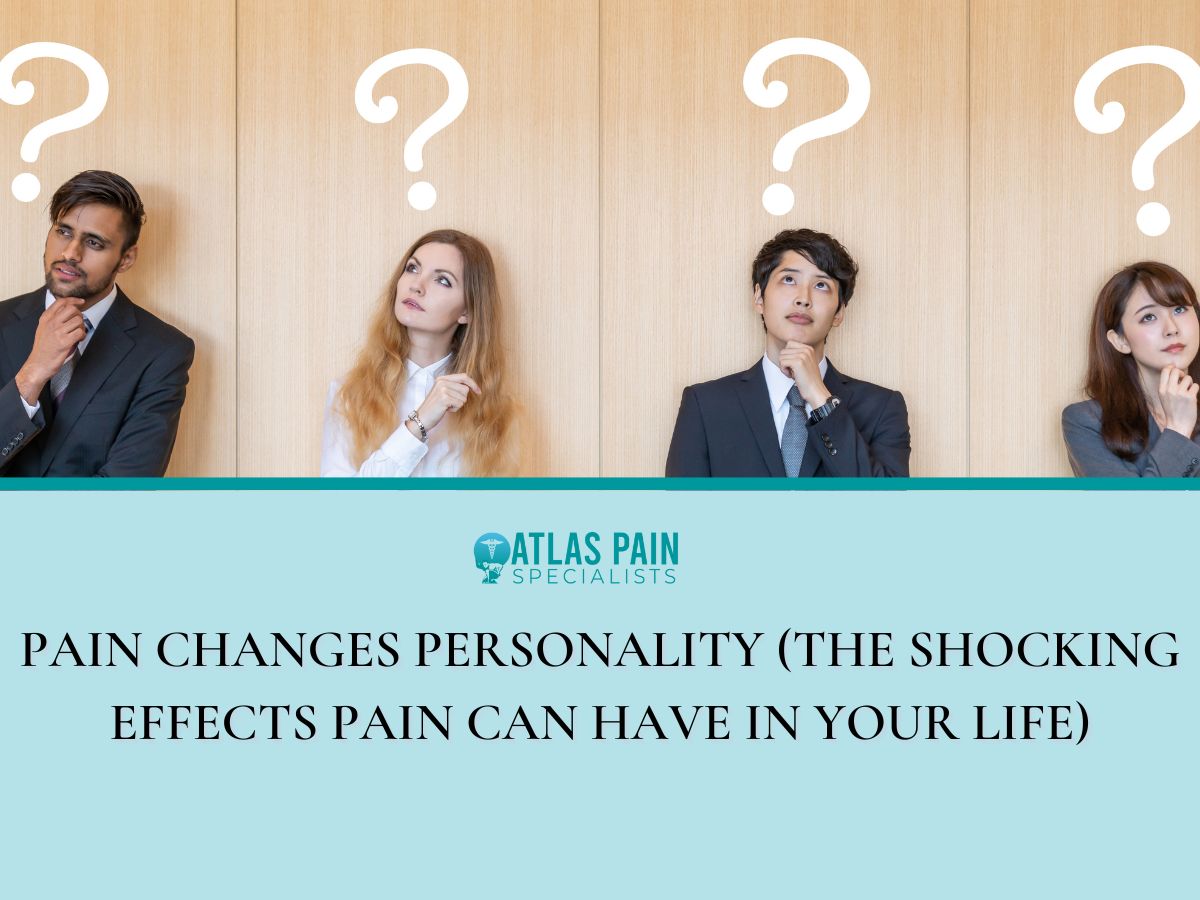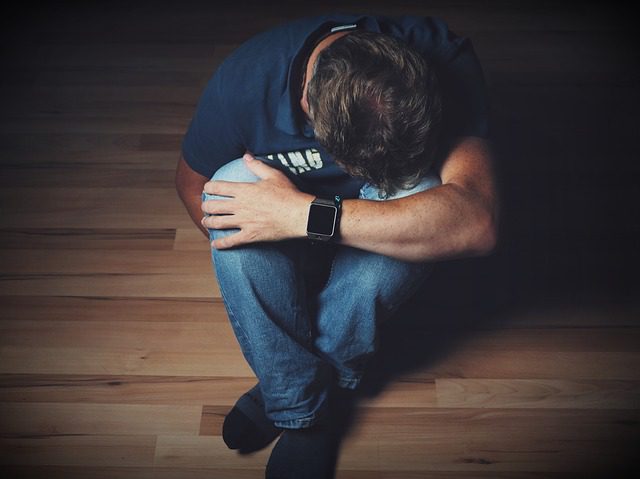

Pain Changes Personality (The shocking effects pain can have in your life)
Chronic pain can have a negative impact on one's outlook, and a lack of optimism can make one feel trapped and helpless. It may seem difficult or impossible to see a happy future for them as they deal with the effects of pain in their lives.
Feelings of anger, frustration, hopelessness, and more may arise if one is in pain. This is quite reasonable, and it is one of the effects of pain, and it is important to know that you are not the only one who feels this way.
It's possible that you've been labeled grumpy by someone close to you, or you've found yourself straying far from your regular self. This article details how pain changes personality, the effects of chronic pain on someone's life and how to go about it.
How pain changes personality
Chronic pain is a source of constant distraction and misery for the majority of people, which may be worsened by periods of relief with recurring pain as it never totally disappears. This can affect one's overall well-being and personality.
The pain can have a significant impact on your mental, emotional and physical health, which may change how you approach and look at things. Individuals suffering from chronic pain may be unable to make rational decisions because they feel trapped.
It can make someone grow isolated over time, and they could become nothing more than a shadow of their once-shining personality. It makes someone stop doing what they used to do, give up on their hopes and goals, or have undesirable personality changes as a result.
Chronic pain can have a catastrophic impact on one's quality of life if it is not addressed. It affects various aspects of their lives, as detailed in this article.
- The physical effects of pain

The most apparent effect of pain on someone is physical, as it is the first sign of pain. Injury, degeneration/old age, and disease are the three most common causes of chronic pain, but there are other causes.
Some of them include slipped discs, broken bones, neck injuries, and more. In some cases, nerve damage and medical procedure-related injuries can cause chronic pain.
Physical pain can be musculoskeletal, but it can also originate from the skin. Burns, tissue damage, and skin conditions, to name a few, are frequently to blame.
Some long-term conditions affect our lives and how we interact with those around us. Arthritis and degenerative disc disease are two long-term illnesses that can be brought on by aging.
Other conditions that cause pain include Osteoporosis, carpal tunnel syndrome, headache-inducing eye diseases, neuropathy, diabetes, fibromyalgia, heart disease, irritable bowel syndrome, and sciatica. Chronic pain is also a side effect of cancer treatment or the disease itself, which may occur as a result of nerve damage produced by some chemotherapy treatments.
Back pain is a common occurrence in most people's lives because we engage our backs during practically all activities involving mobility and locomotion. Injuries to the back and spine have a ripple effect throughout the body whereby some people limp or change their posture in order to alleviate the pain.
People of various ages and socioeconomic backgrounds complain about chronic back, leg, and knee pain, and it can have a number of negative consequences, such as time lost from work, increased medical expenses, weight gain as a result of decreased mobility, inability to have a fulfilling sexual relationship, and less social interaction.
- The mental effects of pain
It is hard to focus when in pain. Most people resort to pain medication to alleviate the pain as the pain hinders their performance, but this can be overwhelming when it comes to chronic pain.
Pain can affect someone mentally, especially if it happens for a lengthy period of time and it's harming their capacity to enjoy life. The pain may also come back at any time, and knowing so reduces someone's ability to live their lives comfortably.
It's not always easy to tell when you need to seek help for mental health arising from chronic pain. In extreme cases, a mental health emergency might result from severe depression, and it's critical to know and understand the mental effects of pain.
You need to listen to your intuition and seek help if you suspect something is off. Some of the mental effects of pain include:
- Sadness and depression
Depression is characterized by a long-lasting melancholy and lack of motivation, while all of us feel sad at some point in our lives. Sadness is a feeling triggered by a variety of life's ups and downs. Depression is a debilitating, long-lasting mental health condition that can have a significant impact on a person's day-to-day activities.
A lot of chronic pain patients are down in the dumps as they mourn the loss of their health and the life they had before the pain. They often get depressed and hopeless.
Sadness and depression are often common reactions to chronic pain conditions such as cancer. Resolving and accepting all of the current shifts may take some time.
When depressed, you may not feel like getting out of bed in the morning, and your appetite may also go down. Some of these emotions pass with time as the pain is managed and through treatment options that aim to treat these effects of pain.
For some people, however, these feelings can intensify when the illnesses don't go away, and their everyday living is interfered with. Many people are unaware that depression is a diagnosable medical disorder that can be remedied with the right medication.
Getting help for sadness and depression
Some of the symptoms of sadness and depression may be caused by physical issues, so you should talk to your doctor about them. It's possible to treat depression and if any of the following symptoms persist for more than two weeks, book an appointment with your doctor to discuss your treatment options.
Emotional signs:
- Sadness that doesn't go away
- Emotional numbness
- Having a short temper and being moody
- Difficulty concentrating and brain fog
- Nervousness or being shaky
- Sense of guilt
- Loss of interest in activities that used to be fun
- Thoughts of pain-infliction or suicidal thoughts
Body changes:
- Unexplained weight loss or weight gain
- Headaches and migraines
- Stomach upsets and diarrhea
- Insomnia and night terrors
A doctor may prescribe you antidepressants to ease your symptoms, and they could also direct you to a different expert.
Do not believe that these feelings are your responsibility to control. Your health and well-being are at stake if you don't get the care you need.
- Stress and anxiety
It's normal to have stress over all the life changes you go through when you have chronic pain. Anxiety happens when you are extra tensed, can't relax, and feel worried.
When you are anxious, you may experience the following symptoms:
- Increased heartbeats
- Feeling shaky or dizzy
- Little or too much sleep
- Difficulty concentrating
- Headaches
- Upset stomach or diarrhea
You may feel anxious from being afraid of the pain returning after treatment. This may also happen when you're doing things that you fear may trigger the pain.
Take, for example, trigeminal neuralgia, which is characterized by an intense moment of pain on one side of the face triggered by simple activities such as brushing teeth or even smiling.
Consult your physician if you experience any of these emotions. Despite the fact that these are frequent symptoms of stress, you should have them checked to be sure they aren't the result of the medication or other medical care.
Stress is tied to a situation that causes it, and it is often resolved with the situation. Symptoms of stress and anxiety are practically identical.
Anxiety can get worse if you don't know what you're worried about. It's easier to keep on track with your wellness goals when you have aid with your anxiety.
Anxiety attacks can be debilitating as they can leave you feeling helpless. Don't be embarrassed to ask for help if you're having trouble relaxing since this will aid your recuperation.
Sharing your feelings with those you can trust is helpful because other people can't always tell what you're going through. If you're worried about your stress, you can ask your doctor for a referral to a counselor for you to talk to or take a class that teaches ways to deal with stress.
- Panic attacks
A panic attack episode is characterized by a sudden increase in feelings of anxiety. People who are having a panic attack may assume they are about to faint out or perhaps die as a result of this overwhelming sensation.
It can be triggered by unresolved anxiety. Some of the symptoms include:
- A racing heart
- Feeling weak or sick
- Difficulty breathing
- A sense of dread
- Shaking or sweating
- Difficulty focusing and dizziness
Anxiety attacks can be confused with heart attacks and strokes, and it is not always possible to discern the difference between the two. Call the emergency services once if you notice any new symptoms or if you see them in someone else.
Panic disorder occurs when you have recurrent panic attacks. It can have a negative impact on your life if you live in terror and avoid certain circumstances out of fear of a panic attack.
Getting help with anxiety and panic attacks
Anxiety and panic attacks can be diagnosed as panic disorders if they are recurrent and affect your life. Treatments such as cognitive behavioral therapy (CBT) and medication have been found to be effective in reducing symptoms.
You can also acquire self-management strategies aimed at controlling such situations like breathing exercises and mindfulness.
- Suicidal or self-harm thoughts
Sometimes chronic pain can evoke difficult feelings that can lead to self-harming or thinking of suicide. It is a serious effect of chronic pain, and you should seek help immediately.
Some chronic pain conditions may be overwhelming, as in the case of the mentioned trigeminal neuralgia, which is also called the suicide disease. It makes those that go through intense periods of pain think of just ending it there, right, and then.
Suicidal or self-harm feelings symptoms differ for everyone, but these are some of the common signs:
- Thinking about death
- Feeling useless or that other people would be better off without you
- Hopelessness and despair
- Overwhelming negative thoughts
- Having no point in living on
- Feeling that the chronic pain will never end
- Being emotionally numb
It is important to keep in mind that suicidal feelings are short-term, and they will go away. How long they last varies, but they often end as soon as you seek help.
If you have these thoughts, you should go to the nearest emergency department, contact your doctor immediately, seek help from designated helplines such as 999, the Samaritans, and more that you can find on the NHS mental health services page.
- The emotional effects of pain

Negative emotional states are closely linked to pain, whereby as a result of long-term pain, people may become depressed or nervous. Substance misuse and other mental health issues also become a concern for them.
Chronic pain has been shown to alter the amounts of stress hormones and neurochemicals in your brain and neurological system, which can have an impact on your mood, thinking, and behavioral patterns. Sadness, frustration, wrath, or a sensation of being misunderstood and demoralized are all normal emotional responses to pain.
Certain chemical imbalances can lead to depression in some persons. Emotional effects of pain are easier to let go of when they're expressed.
- Avoidance
Avoidance is avoiding people, places, or events that may remind you of the situation or trigger it. In the near term, pain-related avoidance behaviors reduce movement-related pain and help prevent further injury, but they can also play an important role in the development or maintenance of chronic pain in some individuals.
Avoidance occurs from anticipating pain rather than as a response to the pain itself. When this persists, so do the opportunities for correcting them.
- Cognition and mood
Pain affects one's thinking and mood. Since thoughts are tied to emotions, they can trigger them.
When you think negatively about yourself can bring about feelings of guilt, blame or worry. You get reduced interest in doing things you once loved.
- Emotionalism
Emotionalism is the difficulty of controlling your emotions. It is sometimes known as emotional liability, whereby your mood changes quickly, and you get more emotional than you were before.
It may be hard for those around you to accommodate the change, but there are a few ways you can overcome this. You should give it time as it passes and always be open to people about it.
You may get people blaming some of your actions or thoughts on emotionalism, but you should let them know that it is genuinely you. You're entitled to comfort and support, and you should not be afraid to ask for it.
- Mania and euphoria
When you're in a manic phase, your emotions are at their most extreme, and they can get wildly out of control. Euphoria occurs when your mood is consistently elevated, and you appear to be in a state of euphoria.
Increased activity during manic episodes may contribute to a cycle of reduced pain intensity as a result of lowered pain perceptions during mania or hypomania. Mood-altering effects of pain-relieving opioids and other traditional analgesics have been proven to increase the likelihood of mania in people with mood disorders that may result from pain.
- Fear and worry
When you get diagnosed with a chronic pain condition, you get the fear of living with the pain forever and triggering it in your daily routines. You can get worried about the treatment success, the bills, keeping your job, taking care of your family, and even dying.
Some of these fears are based on myths about the conditions and wrong information. It often helps to be informed, and you should consult with your doctor if you need any clarification.
Being informed may even help you get better from the positive outcome of the treatment.
- Hope
Hope is an emotion that comes up as a result of positive outcomes of treatment of chronic pain. It occurs after acceptance of the condition, and many reasons bring up hope, such as successful procedures, positive life changes, and pain relief.
Hope gets someone through treatment and painful situations. You can build up hope by talking to those that had successful pain management, talking to your family and friends, and not allowing the pain to limit the things you like to do.
- Guilt
Most people with chronic pain conditions such as cancer may feel guilty or blame themselves for some outcomes of the pain. They may blame themselves for financial burdens, requiring more attention, envying the good health of others, and even their lifestyle choices that they may think led to the condition.
You need to know that the condition is not your fault, and it may help to share your views with someone.
- Loneliness
People with chronic pain often feel lonely or distant from those around them. This can occur as a result of many reasons that may be personal or from those around you.
Friends and family sometimes have a hard time dealing with the personality changes and the effect the pain has on you. They may also not enjoy doing things you used to do together.
It's normal to feel lonely after treatment, especially since you used to be around other patients and medical practitioners that gave you extra help and support. You can look for emotional support by talking to family, friends, your doctor, or joining a community.
- Being overwhelmed
You can feel overwhelmed when you think your life is getting out of control. It can happen when you have a condition that brings about chronic pain that changes your lifestyle.
Visits to the doctor, difficult medical terms, remission, loneliness, and disruption of your daily routines can make you overwhelmed.
- Anger and frustration
You may feel angry when in pain from a variety of triggers. You may be frustrated by the actions of those around you and even during treatment, such as physical therapy, where you are required to push past your comfort zone.
You may get angry when you ask yourself, 'why me?' and when this happens, it's not healthy to keep it inside. You may talk to friends and family as well as your doctor, as anger can be a motivation to take action.
Frustration can be a result of many things, including not being able to do things you used to do before. It can result from having to rely on others and the limitations the pain brings to certain aspects of your life.
When you get angry or frustrated, you need to find positive ways to release the emotions. You can talk to others to work out what triggers these emotions and how to deal with them.
How to approach the effects of pain on your life
Living with chronic pain impacts everything. You may have tried to deal with the effects pain has on your life, and it is important to know that no response is correct or wrong.
People react to pain in different ways, and they all have different ways of coping. When you get news of a life-altering condition, the first step is accepting and knowing that it can be dealt with.
At the moment, avoiding your emotions may seem preferable, but they exist whether you notice them or not, and ignoring them will raise stress and slow recovery.
If you let yourself feel what you feel, even severe, disturbing feelings will pass, your initial distress at your diagnosis will subside, and some areas of life will return to normal.
Treatment and recovery take time, and after a diagnosis, you should give the treatment time and follow your doctor's instructions to get better. It's normal to get nervous when waiting for recovery, and false information and myths can worsen this.
When you're uncertain, you can still eat well, exercise, and pursue relationships and activities that bring you joy. You can adjust your routines to accommodate the change and keep an open mind to help you see the good in the bad.
Frequently Asked Questions
How can family help a loved one through pain?
It can be difficult to know what to do when a family member is in pain. The physical aspects of pain can be taken care of through treatments aimed at pain management, but the mental and emotional effects of pain are unseen and hard to tell.
When someone is in pain, there are a few things the family members can do to help them through it. Some of them include:
Talk to them
Spend some time with them
Support their independence
Help them stay active
Be patient
About Dr. Sean Ormond



